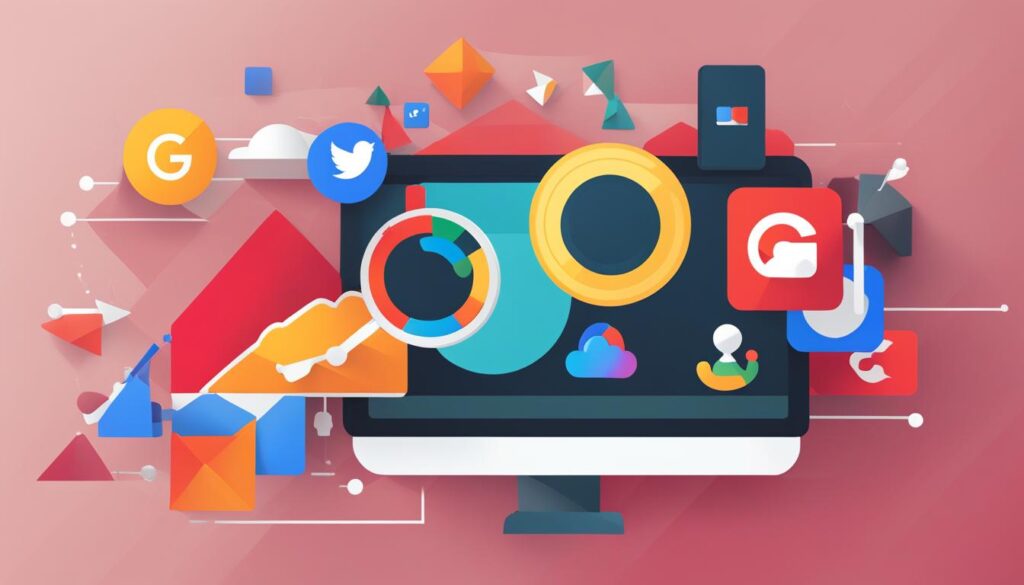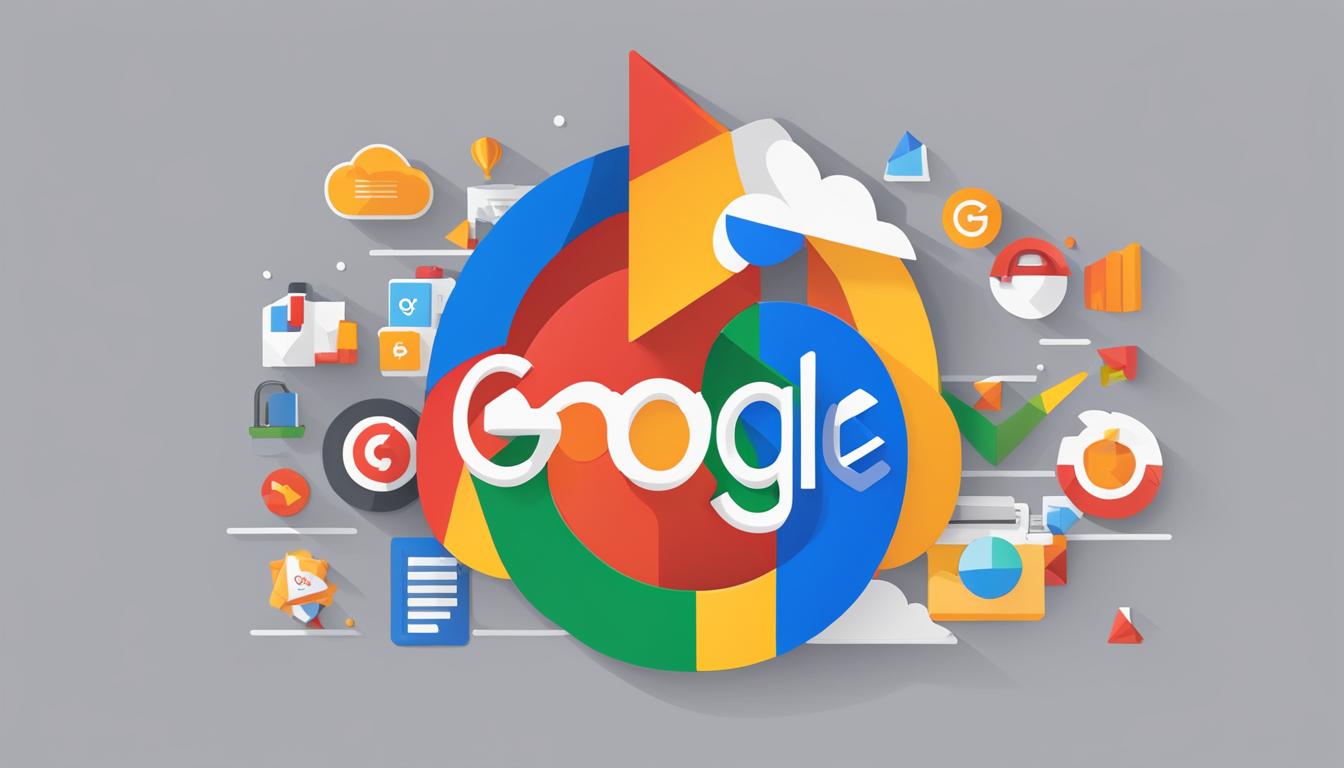Embarking on a digital marketing career is possible even without prior experience or formal degrees. As a digital marketing expert with over 15 years in the field emphasizes, beginners can develop the necessary skills through various online resources and go on to provide client services worldwide. This guide presents well-rounded insights on how to get into digital marketing, helping you launch a successful digital marketing career. Learn the fundamental knowledge and expertise needed to become a digital marketer and start digital marketing projects with confidence. Follow this digital marketing guide to set yourself up for victory in the ever-evolving landscape of the digital world.
Key Takeaways
- Understand the fundamentals of digital marketing to build a strong foundation.
- Develop practical skills by creating a personal website and working on real-life projects.
- Master crucial platforms such as Google Ads, Facebook Ads, and Google Analytics.
- Gain hands-on experience through freelancing, internships, and networking opportunities.
- Stay up-to-date with industry trends and continuously refine your digital marketing skills.
Understanding the Digital Marketing Landscape
The digital marketing landscape is vast and encompasses a variety of digital marketing channels that enable businesses to reach and engage with their target audience online. Grasping the different facets of this landscape is essential for aspiring digital marketers looking to carve out a successful career in the field.
Here is a breakdown of the principal digital marketing channels that form the foundation of a comprehensive online marketing strategy:
- Search Engine Marketing (SEM)
- Search Engine Optimization (SEO)
- Content Marketing
- Social Media Marketing
- Email Marketing
- Mobile Marketing
- Affiliate Marketing
- Video Marketing
Online marketing is a multidisciplinary field, which means that rather than being a singular discipline, digital marketing is an integration of several processes calling for specialists skilled in diverse channels. Each of these channels has specific techniques, tools, and best practices that marketers must master to thrive in the digital era.
| Channel | Description | Purpose |
|---|---|---|
| Search Engine Marketing (SEM) | Paying for ad space within search engine results pages to reach target audiences. | Increase website visibility and drive conversions. |
| Search Engine Optimization (SEO) | Optimizing website content and structure for search engine visibility. | Create organic website traffic and improve search rankings. |
| Content Marketing | Creating and distributing valuable content to engage an audience. | Build trust, authority, and generate leads. |
| Social Media Marketing | Leveraging social platforms to engage users and promote brands. | Create brand awareness, foster relationships, and drive conversions. |
| Email Marketing | Sending promotional messages to a targeted audience using email. | Retail engaged customers and drive sales. |
| Mobile Marketing | Targeting mobile device users with specific marketing campaigns. | Capture and engage mobile users and drive sales. |
| Affiliate Marketing | Promoting products or services in exchange for a commission on sales or leads. | Generate sales or leads through a network of affiliates. |
| Video Marketing | Creating and sharing video content aimed at engaging users and promoting products. | Create brand awareness, engage users, and generate leads. |
As a digital marketer, it’s crucial to be fluent in each of these disciplines and know how to effectively combine these channels to drive results online. This expertise helps marketers achieve their clients’ and organizations’ goals, making them valuable assets in the digital marketing realm.
The Importance of a Strong Foundation: Learning the Basics

Foundational knowledge in digital marketing is essential for building a successful career in the field. This involves understanding the core components and techniques, as well as identifying suitable learning resources tailored to one’s situation. Setting practical goals and having realistic expectations allows aspiring digital marketers to progress in the competitive industry.
The Key Components of Digital Marketing
Digital marketing entails various components, including SEO fundamentals, SEM techniques, analytics understanding, social media proficiency, and email marketing basics. Developing a strong foundation in these fundamental aspects paves the way for a flourishing career in the dynamic digital marketing field.
Finding the Right Learning Resources
Identifying the right digital marketing learning resources is key to efficiently acquiring necessary skills and certifications. A wide variety of digital marketing courses, marketing training options, digital marketing bootcamp experiences, and digital marketing certifications are available to cater to different needs and budgets. For instance, BrainStation’s Digital Marketing bootcamp highlights the importance of structured learning and offers a comprehensive curriculum for individuals seeking a successful career in digital marketing.
Setting Realistic Goals and Expectations
Setting realistic digital marketing goals, career path expectations, and marketing objectives is crucial for those embarking on their digital marketing journey. Managing self-expectations and assessing progress regularly helps in achieving the desired outcomes in the demanding digital marketing industry. Determining a clear career trajectory allows digital marketing professionals to measure their development, make data-driven decisions, and adjust strategies as needed to excel in their chosen niche.
By mastering the digital marketing fundamentals and harnessing knowledge from diverse resources, aspiring digital marketers can effectively navigate the path to a rewarding career in the digital marketing sphere.
Creating Your Own Digital Presence

A vital step in becoming a successful digital marketer is to start your own website and build a robust digital presence. As you apply digital marketing techniques to your website, you can showcase your digital marketing skills and create an attractive portfolio for potential employers or clients. A well-ranked website with significant traffic highlights your expertise and validates your credibility in the digital marketing field.
“Your online presence is your professional calling card. Ensure that it reflects your talent as a digital marketer and paves the way for career advancements.”
Developing your online presence as a digital marketer involves several critical steps:
- Choose a niche that aligns with your experience or interests.
- Select a domain name and hosting provider for your website.
- Design your website, focusing on user experience (UX) and easy navigation.
- Create valuable content that showcases your content writing and marketing skills.
- Optimize your website for search engines, adhere to SEO best practices, and establish a backlink strategy to enhance visibility.
Additionally, consider creating a blog section to demonstrate your expertise and provide helpful insights to your audience. Blogging about industry trends and tips will serve as an added advantage to your digital presence.
| Activity | Benefits |
|---|---|
| Choosing a niche | Establishing focused expertise and building a target audience |
| Selecting a domain name and hosting provider | Creating a solid foundation for your website |
| Designing a UX-focused website | Enhancing user engagement and improving conversion rates |
| Creating valuable content | Demonstrating expertise and adding value to readers |
| Optimizing for search engines and building backlinks | Increasing traffic, improving search visibility, and establishing authority |
As you develop your website and online presence, use analytics tools to track your site’s performance. Regularly review your website’s data to identify areas of improvement and make necessary adjustments. With a successful digital presence, you validate your skills and abilities in the digital marketing realm, paving the way for a flourishing career.
Becoming Proficient in SEO and Content Marketing

Becoming an SEO expert is a fundamental requirement for thriving in a digital marketing career. Proficiency in SEO teaches you how to optimize websites for users and search engines, directly influencing the success of your paid search and social campaigns. Mastering SEO and content marketing strategies is a gradual process but essential for advancing within the digital marketing realm.
SEO and content marketing are intertwined, making it crucial to understand the relationship between these two core components. To build a successful SEO career, key areas to focus on include:
- Keyword research and planning
- On-page and off-page optimization
- Technical SEO
- Link building strategies
- Staying updated on algorithm changes and industry trends
Content creation and promotion are essential aspects within the content marketing sphere. Content marketing strategies target educating, inspiring, and engaging audiences to boost website traffic and user conversion. To strengthen your digital content marketing aptitude, develop skills in:
- Content creation (blogging, videos, social media, etc.)
- Content promotion and distribution
- Target audience identification and segmentation
- Content measurement and analytics
“Search engine optimization (SEO) and content marketing are two critical components that, when effectively combined, drive traffic to websites.”
By acquiring and honing search engine optimization skills, you will facilitate improved visibility for your online content, while exceptional content creation will retain the interest of your target audience. To accelerate your learning curve and expedite career growth, consider exploring workshops, online tutorials, and mentorships from established professionals to further enhance your abilities.
In conclusion, becoming proficient in SEO and content marketing is indispensable for any digital marketer aspiring to excel in the field. By focusing on the aforementioned areas, you will develop the foundational skills necessary to elevate your career and differentiate yourself as a skilled digital marketing professional.
Mastering Paid Advertising: Google Ads and Social Media

Achieving proficiency in paid advertising through platforms such as Google Ads and Facebook Ads is crucial for digital marketers. These tools help in promoting businesses and increasing sales by targeting the right audience. Earning certifications and demonstrating mastery in these platforms make marketers more credible and sought-after by clients and employers.
- Google Ads Certification: Becoming Google Ads certified ensures that digital marketers possess essential knowledge and skills to create, manage, and optimize Google Ads campaigns. The certification programs cover search advertising, display advertising, shopping advertising, video advertising, and app advertising. Acquiring this certification demonstrates technical expertise and proves the marketer’s commitment to staying updated with the latest Google Ads features and best practices.
- Facebook Ads Mastery: Mastering Facebook Ads requires leveraging the platform’s advanced targeting capabilities, engaging ad formats, and robust reporting tools to drive results. Developing expertise in creating compelling ad creatives, optimizing ad delivery, testing various ad formats, and monitoring campaign performance generates desired outcomes and better return on ad spend for clients.
“By securing certifications and mastering these platforms, marketers can substantiate their proficiency to clients and employers.”
Beyond Google Ads and Facebook Ads, digital marketers should also develop skills in other prominent social media advertising platforms such as Instagram, Twitter, LinkedIn, Pinterest, and TikTok. Each of these platforms caters to different target groups, industries, and content types. Familiarizing oneself with their unique advertising features helps marketers craft targeted, efficient, and high-performing campaigns across platforms.
One crucial aspect of paid advertising expertise is the understanding of PPC (Pay-Per-Click) campaigns. PPC advertising allows marketers to bid on specific keywords relevant to their product or service and get their ads displayed in search results or on partner websites. The advertiser pays only for the clicks they receive on these ads. This strategy can drive substantial traffic and conversions, provided the marketer acquires the necessary skills to manage keywords, bids, and ad schedules effectively.
[blockquote>“PPC advertising is an important component of paid advertising expertise, benefiting marketers who invest in learning and mastering it.”
Here is a summary highlighting the key paid advertising platforms and certifications to be considered by aspiring digital marketers:
| Platform | Certification |
|---|---|
| Google Ads | Google Ads Certification |
| Facebook Ads | Facebook Blueprint Certification |
| Instagram Ads | Facebook Blueprint Certification |
| Twitter Ads | Twitter Flight School |
| LinkedIn Ads | LinkedIn Marketing Partner Certification |
| Pinterest Ads | Pinterest Academy Completion |
| TikTok Ads | TikTok Ad Practitioner Certification |
Ultimately, mastering paid advertising necessitates continuous learning, experimentation, and optimization. Keeping pace with the ever-evolving paid advertising landscape ensures digital marketers remain indispensable and agile within the industry.
Gaining Expertise with Google Analytics and Data Analysis

The competitive world of digital marketing necessitates a solid foundation in Google Analytics expertise, digital marketing metrics, and data analysis. Gauging the effectiveness of marketing campaigns and adjusting strategies accordingly is pivotal to success in the industry. This section highlights how to comprehend metrics and KPIs in marketing, and make informed, data-driven marketing decisions.
Understanding Metrics and KPIs
Key Performance Indicators (KPIs) are metrics that evaluate the effectiveness of a campaign by quantifying progress towards specific marketing objectives. Performance measurement is a vital part of any data-driven marketing strategy and mastering analytical skills in marketing is crucial.
“Without data, you’re just another person with an opinion” – W. Edwards Deming
Below is a list of essential digital marketing metrics:
- Website traffic – The number of visitors to a website.
- Bounce rate – The percentage of visitors who navigate away from a site after viewing only one page.
- Conversion rate – The percentage of website visitors who complete a desired action, such as submitting a form or making a purchase.
- Cost per click (CPC) – The average cost paid for each click on a pay-per-click advertising campaign.
- Click-through rate (CTR) – The ratio of clicks on an advertisement to the total number of times the ad was shown (impressions).
- Return on investment (ROI) – The profitability of a marketing campaign, calculated by dividing the profit gained from the campaign by the total cost.
These metrics can be monitored through Google Analytics, a powerful tool capable of tracking numerous aspects of your online efforts.
Learning to Make Data-Driven Decisions
To become an expert in data analysis in marketing, it’s essential to cultivate a mindset that emphasizes analytics-driven strategy and campaign data review. Learning to interpret marketing data and make data-driven marketing decisions will enable marketers to optimize strategy and maximize ROI.
Follow these steps to facilitate data-driven decision-making:
- Establish the marketing objectives and KPIs relevant to your campaign.
- Collect and analyze data using Google Analytics or other analytical tools.
- Based on the results, identify trends and patterns that could inform your strategies.
- Implement changes and optimizations to improve marketing efforts.
- Monitor the impact of adjustments and refine the approach accordingly.
Mastery of data analysis will enable marketers to optimize the performance of all marketing channels, leading to better ROI and sustained success in the digital marketing field.
Building Practical Experience Through Freelancing

In the rapidly evolving world of digital marketing, it has become increasingly important for beginners to gain practical marketing experience to complement theoretical knowledge. One viable way of doing this is through freelance digital marketing. It enables budding marketers to develop a wide range of skills while working on real-world projects and interacting with clients.
Freelancing provides the perfect opportunity for those seeking to gain hands-on experience in different areas of digital marketing. Not only does it help develop crucial skills, but it also facilitates understanding of client needs, managing budgets and communications, and refining analytics and reporting competencies. This makes freelancing an excellent stepping stone toward a full-time digital marketing career.
Exploring Client Services in Marketing
Working as a freelance digital marketer offers several benefits, including exposure to a wide variety of client services in marketing. This exposure allows marketers to enhance their understanding of varied business models, marketing goals, and target audiences. Additionally, it enables professionals to hone their niche expertise and align their services with specific clients’ needs and expectations, ultimately improving overall client satisfaction.
Finding Freelance Job Platforms
There are a plethora of freelance job platforms available to aspiring digital marketing professionals, making it easier than ever to embark on a freelancing journey. Some popular job platforms ideal for part-time digital marketing opportunities include:
- Upwork
- Freelancer.com
- Fiverr
- PeoplePerHour
These platforms enable freelance digital marketing professionals to find and apply for various marketing projects, build client relationships, and create a strong portfolio showcasing their skills and experiences.
“Freelance digital marketing work serves as a pathway to larger projects and more substantial responsibilities in the digital marketing domain.”
Focus on Part-Time Digital Marketing
When starting out, it can be beneficial to seek part-time digital marketing opportunities to gradually build a client base without burning out. Striking a balance between theoretical knowledge and practical marketing experience is essential in building a solid foundation for a successful career in digital marketing. Part-time work allows professionals to allocate enough time for self-development, acquiring new skills, and staying updated with emerging industry trends.
Seeking Internships and Networking Opportunities
As a budding digital marketer, it’s essential to immerse oneself in hands-on experiences and build connections with industry professionals. Digital marketing internships and marketing industry networking events play a critical role in expanding your knowledge and skills.
Pursuing internships in marketing agencies allows you to work alongside established marketing professionals, offering valuable insights into the operational aspects and best practices of the industry. This experience can accelerate your skill development and significantly enhance your resume.
Peter Drucker once said, “The best way to predict the future is to create it.” Engaging in digital marketing internships and networking opportunities is about creating your own future in the industry.
Alongside internships, establishing a strong network within the marketing industry is vital for professional growth. Building relationships, connecting with marketing professionals, and attending industry events can lead to exciting collaborations, mentorships, or even full-time employment opportunities.
- LinkedIn Groups: Join LinkedIn groups related to digital marketing to access a diverse community of professionals, share insights, and discuss industry trends.
- Meetup Events: Participate in local marketing-related Meetup events to interact with peers, learn from experienced professionals, and make lasting connections.
- Industry Conferences: Attend digital marketing conferences and workshops for learning opportunities, networking sessions, and potential collaborations.
- Alumni Associations: Leverage the resources provided by your college or university’s alumni association for connecting with other marketing professionals who share a common academic background.
By actively engaging in internships and networking events, you can foster long-term relationships, refine your skills, and ultimately advance your career within the digital marketing industry.
Embracing Continuous Learning and Staying Updated
In the ever-changing landscape of digital marketing, it has become crucial to engage in continuous digital marketing learning and keep updating marketing skills. Staying current with marketing industry updates and always being ready for change is a fundamental aspect of achieving sustainability in your digital marketing career.
With rapid advancements in technology and the emergence of new platforms and strategies, digital marketers must prioritize learning and staying abreast of trends in the industry. A proactive approach to learning marketing trends will ensure you remain adaptive, flexible, and relevant in the face of growing competition.
“Continuous learning is the minimum requirement for success in any field.” – Brian Tracy
Becoming a sought-after digital marketing professional entails more than just mastering basic skills. Here are some key strategies for staying current with developments in the digital marketing landscape:
- Subscribe to industry-leading blogs or newsletters to receive updates and actionable insights.
- Join social media groups or online communities of marketing professionals to exchange ideas, share experiences, and gain knowledge.
- Participate in webinars or workshops on specific subjects to enhance your existing skills and explore new areas of interest.
- Attend conferences or networking events to connect with like-minded professionals and learn about the latest innovations and best practices.
- Invest in ongoing education by enrolling in advanced courses or earning certifications in your field of expertise.
By embracing continuous learning and dedicating yourself to staying updated with the latest industry trends, you will set the stage for a long-lasting and successful career in digital marketing.
Conclusion
Transitioning to a successful digital marketing career involves gathering the necessary skills, gaining practical experience, and remaining dedicated to ongoing learning. To effectively navigate the path to a fulfilling and dynamic digital marketing career, it’s essential to follow each step systematically, from building foundational knowledge to mastering various marketing tools.
As the digital marketing landscape constantly evolves, it’s crucial for aspiring digital marketers to comprehend their role and adapt to industry updates, algorithms, and emerging trends. By doing so, professionals can secure entry-level digital marketing jobs, and eventually work their way up in this competitive industry.
In conclusion, starting a career in digital marketing is attainable for those willing to invest time and effort into mastering the essential skills and tools needed for success. A well-rounded digital marketer should be proficient in SEO, content marketing, paid advertising, and Google Analytics, among other expertise. With determination and continuous learning, a prosperous and rewarding digital marketing career awaits.
Also Refer : Effective Strategies For Law Firm Digital Marketing Success
FAQs
Q: Can I start a digital marketing career without prior experience or a formal degree?
A: Yes, you can start a digital marketing career without prior experience or a formal degree. Digital marketing is a field where skills and practical experience are often more valuable than formal education. There are numerous online resources available to learn and build the required skills, such as online courses, tutorials, and certifications.
Q: What are the different channels and components of digital marketing?
A: Digital marketing channels include Search Engine Optimization (SEO), paid search advertising, website promotion, content deployment, email campaigns, social networking, mobile app store marketing, video outlets, and affiliate sales. Components of digital marketing involve understanding SEO, SEM, analytics, social media strategies, and email marketing.
Q: What learning resources are available for aspiring digital marketers?
A: Aspiring digital marketers can explore a range of learning resources, such as online courses, digital marketing certifications, webinars, blogs, and immersive bootcamp experiences like BrainStation’s Digital Marketing bootcamp.
Q: How can I develop hands-on experience in digital marketing?
A: To gain experience in digital marketing, consider creating and managing your own website, pursuing freelance projects, internships with digital marketing agencies, and networking with marketing professionals.
Q: Why is mastering SEO and content marketing important for a digital marketing career?
A: Mastering SEO and content marketing is crucial as it teaches you how to optimize websites and content for both users and search engines, enhances your paid search and social campaigns, and helps you thrive in the digital marketing field.
Q: What are the key advertising platforms for digital marketers?
A: Key advertising platforms for digital marketers include Google Ads and Facebook Ads, which allow you to reach your target audience and promote products or services effectively.
Q: How can I stay updated with the latest trends and changes in digital marketing?
A: To stay updated with the latest trends and changes in digital marketing, subscribe to industry blogs, attend webinars and conferences, and engage with other professionals in the field. Embrace continuous learning to meet the demands of an evolving market and stay ahead in your career.
Q: What is digital marketing and why is it a popular career choice?
A: Digital marketing is the practice of promoting and selling products or services using online marketing tactics such as social media marketing, search engine optimization, and email marketing. It’s a popular career change choice due to the increasing demand for digital marketing professionals in today’s digital era.
Q: How can I become a digital marketer with no experience?
A: To become a digital marketer with no experience, you can start by learning digital marketing through online courses, gaining practical knowledge through internships or freelance projects, and building a strong online way to get started help you become presence showcasing your digital skills.
Q: What are some entry-level digital marketing jobs I can apply for?
A: Some entry-level break into digital marketing jobs include understand what digital marketing specialist, digital marketing assistant, social media coordinator want to become, content marketing intern, and email marketing associate.
Q: What are the essential skills I need to land a digital marketing job?
A: To land a career as a digital marketer positions job, you need to possess skills such as knowledge of different digital marketing tools, understanding of digital channels, strong communication skills, analytical abilities, creativity, and the ability to adapt to changing digital marketing trends.
Q: How can I get started in digital marketing?
A: To get started in get a digital marketing job, you can enroll in digital marketing with no experience positions courses, gain practical experience through internships or freelance work, build a strong professional network in the digital marketing industry, and actively participate in digital marketing communities.
Q: Is it possible to work in digital marketing without a degree?
A: Yes, it is possible to work in digital marketing concepts without a degree. Many employers value practical experience and skills in digital marketing, so gaining experience through internships, freelance work, or specialized digital marketing courses can be beneficial for securing a job in the field.
Q: What are the key digital marketing tools I need to learn?
A: Some key get a first digital marketing job tools include Google Analytics, SEMrush, Hootsuite, Mailchimp, Ahrefs, Canva, and Buffer. These tools are widely used for data analysis, social media management, email marketing, and search engine optimization.
Q: What are the different aspects of digital marketing that I should be familiar with?
A: As a digital marketing manager, you should be familiar with various aspects of digital marketing such as social media marketing, content marketing, search engine optimization, email marketing, paid advertising, marketing analytics, and marketing automation.
Q: How can I land a job as a digital marketing specialist?
A: To land a job as a digital marketing is a great specialist, you should gain expertise in a specific area of digital marketing degrees, build a strong portfolio showcasing your work experience, obtain relevant certifications get your foot, way to learn and actively seek opportunities to demonstrate your skills and knowledge in the field.
Q: What are the career prospects for digital marketing professionals?
A: Digital marketing strategies manager professionals have promising career prospects as the demand for digital marketing expertise continues to grow across various industries. As a digital marketer, you can explore diverse job opportunities ranging from job in new digital marketing campaign specialist to marketing manager and beyond.













